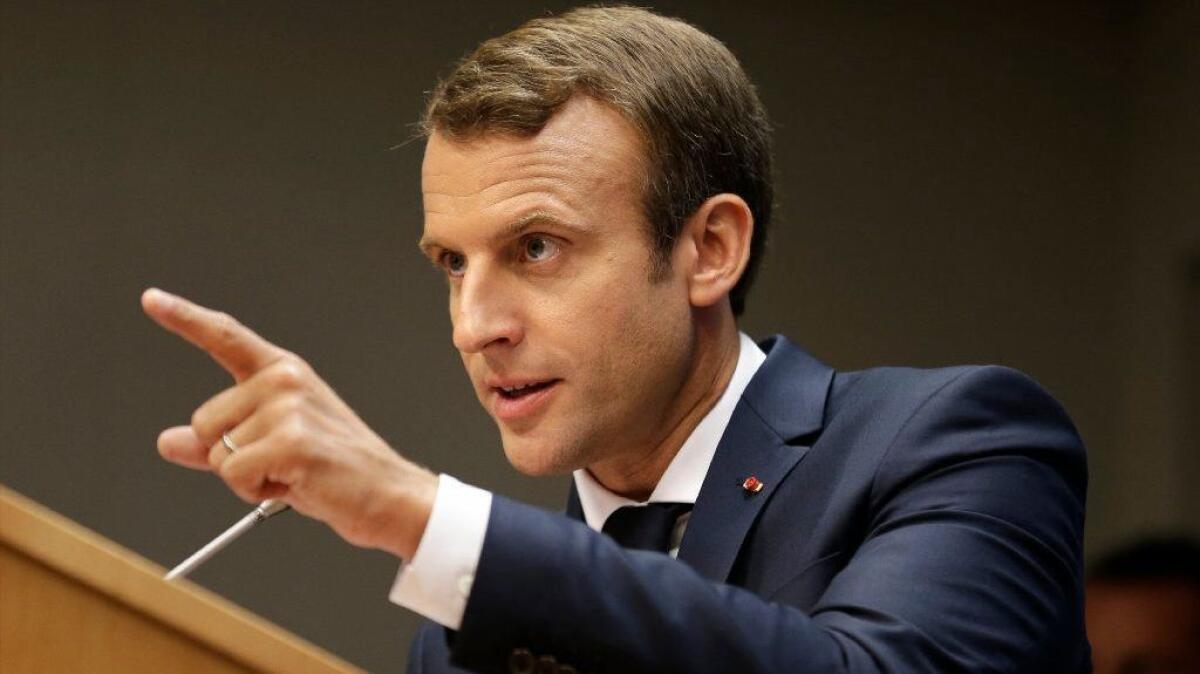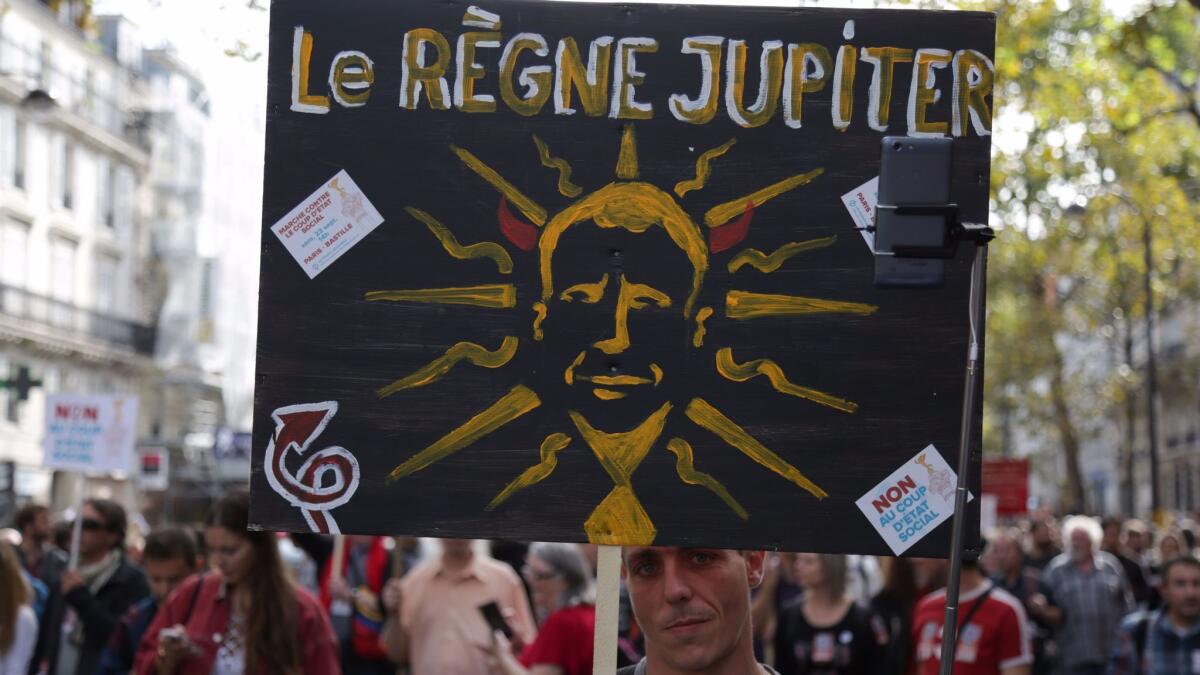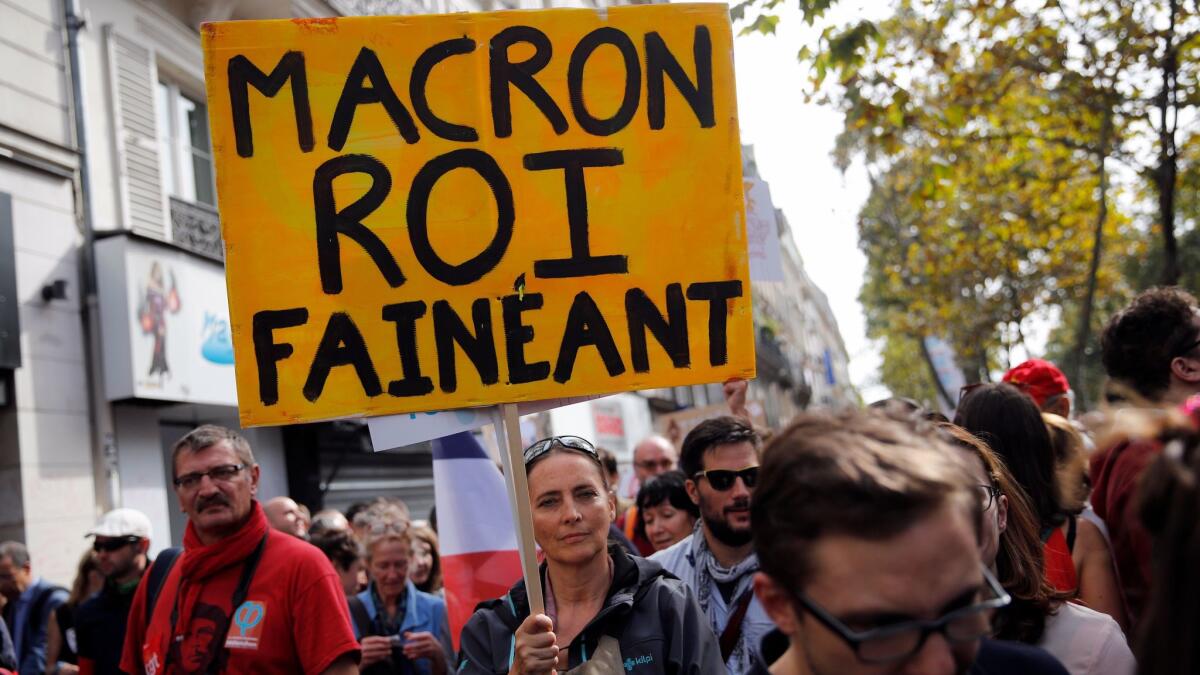Emmanuel Macron wanted to rule like Jupiter, but governing France has brought him quickly down to earth

- Share via
Reporting from PARIS — There was something undeniably appealing about the handsome young investment banker who spoke loftily of transforming France’s rigid old order — and reminded some fans of a gap-toothed John F. Kennedy.
“He was seductive,” Martine Barbier, a 50-year-old social worker, said of Emmanuel Macron, who earned her vote in France’s May presidential election even though she feared he was untested and, in a country long ruled by dour establishment figures, too nakedly ambitious.
Four months later, Barbier joined thousands demonstrating against Macron at the Place de la Bastille in Paris, assailing the new president’s labor reforms as elitist and pro-business, far from the inclusive optimism of his campaign.
“There was so much euphoria and hope about him,” Barbier said. “But that was a sort of delirium.”
At the start of the summer, Macron, 39, stood atop the Western political world, a telegenic independent who created his own party and slew a far-right populist challenger, Marine Le Pen, by promising something for almost everyone: free-market economic reforms, tax cuts, liberal social policies, strengthening the European Union.
Macron once said he wanted to be a “Jupiterian” leader, unchallenged and detached from trivialities, like the Roman god of the skies. But the mundane challenges of governing — and a series of public relations missteps — have dragged the political neophyte swiftly down to earth.

Only 30% of respondents in a YouGov poll last month said they approved of Macron, down from 43% in June. It was a sharper fall over the same period than that of his predecessor, Francois Hollande, who was so disliked by the end of his five-year term that he didn’t bother seeking reelection.
As Macron begins the toughest part of his agenda — trimming France’s social welfare system to make the economy more competitive, and working with Germany to promote deeper European integration — he could confront opposition not only from powerful labor unions but also from middle-of-the-road voters who are skeptical that he can succeed where previous French leaders have failed.
“It is normal for a new president to have a drop in popularity in the first months, but the abnormal thing for Macron is that his drop has been faster and stronger than others before him,” said Thomas Guenole, associate research fellow at the French Institute for International and Strategic Affairs in Paris.
The problem for Macron, Guenole said, is that “centrist voters are the most volatile of all. It is an inherently fragile electoral support.”
The numbers aren’t altogether surprising, given that Macron won just 24% of the vote in the first round of presidential balloting and many voters, including Barbier, chose him in the second round mainly to reject Le Pen. Aides are banking that his support will return, but they also have been busy attending to self-inflicted crises.
In August, it was reported that Macron, the youngest French leader since Napoleon, was spending $10,000 per month on a makeup artist to buff him up for public appearances.
Before that, he had to withdraw a plan to create an office for his wife — France has no first lady position — after more than 300,000 opponents signed an online petition. (The idea seemed especially inopportune because one of Macron’s campaign rivals was derailed by accusations that he had paid his wife for a fake parliamentary job.)
He alienated conservatives by engaging in an ugly public spat with the army, France’s most beloved institution, over his proposal to cut nearly $1 billion in defense spending in order to meet EU deficit targets. The army chief, Gen. Pierre de Villiers, resigned in protest after Macron suggested in newspaper interviews that he was angry at having his decisions questioned.
Last month, he annoyed liberals when he called opponents of his economic reforms “lazy” — recalling an incident from 2016 when, as Hollande’s economy minister, he retorted to a pro-labor demonstrator who jeered at his well tailored suit: “The best way to afford a suit is to work.”
The elitist moniker has stuck to Macron as he pushes ahead with his first salvo in the reform battle: undoing some of the protections guaranteed to French workers, perhaps the most pampered labor force in the industrialized world.
France’s byzantine, 3,300-page labor code enshrines a 35-hour workweek, near-absolute job security, generous severance packages for laid-off staff — even a mandatory meal break every six hours. The safeguards and benefits are widely blamed for France’s stagnant economy and an unemployment rate that hovers around 10%.
Macron’s reforms, unveiled in August, aim to loosen restrictions on businesses to spur hiring and innovation. The main changes reduce payouts for laid-off workers and allow small- and medium-sized companies, which employ more than half the French workforce, to bypass powerful trade unions and negotiate directly with employees over working conditions.

The changes were always going to be contentious — French people, Macron said in another typically brusque comment, “detest” reforms — but analysts said the initial proposals further alienated centrists.
“The first economic announcements in July and since have given the impression of a mainly right orientation, when Macron campaigned on a ‘left and right’ message,” said Bruno Cautres, a professor at the Center for Political Research at Sciences Po, a university in Paris.
In Jupiterian fashion, Macron introduced the changes by executive decree and signed them into law last month. The procedural tactic avoided debate in Parliament, but with his party holding a majority in the lower house there was little political opposition.
Further reforms could prove tougher, especially if Macron keeps pledges to trim France’s massive public sector and amend the pension system. But street protests, which were the death knell of previous governments’ reform efforts, did not turn out large enough crowds in September to disrupt Macron’s agenda.
One of the country’s biggest unions, the Force Ouvriere, gave a boost to Macron by saying it wouldn’t participate in demonstrations, signaling that its leaders were encouraged by government concessions such as increasing funds for occupational training.
Arun Kapil, a political science professor at the Catholic University of Paris, said Macron’s changes so far are “not huge” and could help France move away from a rigid, hierarchical employment system to one more suited to the modern economy.
“Macron wants to introduce flexibility and he wants to change the dynamic psychologically,” Kapil said. “Luckily for him, it’s coming at a time when economic growth is picking up — not because of anything he’s done — but if he gets the dynamic going, it could change things for the better in France.”
Macron’s supporters are continuing an effort begun during his campaign, going door to door to sell the reforms to constituents. On a recent Saturday morning, Stephan Savarese stood outside a subway station in a working-class district of north Paris, handing out leaflets proclaiming, “Let’s transform France and unblock jobs.”
Savarese, a 48-year-old environmental consultant, ditched Hollande’s Socialist Party to join Macron’s En Marche! (“Onward!”) movement soon after its launch 18 months ago. He said France’s small companies suffer because of a lack of “social dialogue” between employers and employees, with laws on working conditions set by the state.
Winding through cobblestone streets below the white-domed Sacred Heart Basilica, Savarese thrust fliers into the hands of shopkeepers and residents, many from North and West African immigrant communities that suffer disproportionately high unemployment.
“Small communications mistakes are negligible compared to what Macron brings, which is vision, hope and a will to change the way things are done,” Savarese said.
But anger from both the right and left is rising. Last month, rival conservatives strengthened their majority in the Senate, France’s upper house, where members are chosen by elected officials who oppose Macron’s plans to cut the budgets of local governments. Macron’s party fell far short of the seats it had hoped for.
On the left, many believe Macron’s style has done lasting damage.
“He’s too arrogant,” said Alain Fauvel, a 70-year-old retiree watching the recent protest from a sidewalk. “If we go down his path, workers will have no rights at all. He doesn’t know the workers — he has barely lived at all.”
ALSO
The return of the far right in Germany: What does the rise of the AfD party mean?
Welcome to Special Rich Guest Hamburger, the China edition of Fatburger
Follow @SBengali on Twitter
ALSO
EU and Spain turn down Catalonia’s plea for mediation after independence vote
A movie about a czar’s love affair ignites violent protest from Russia’s religious right
In Spain, police suspect the seed for recent Islamic State attacks was planted years ago
More to Read
Sign up for Essential California
The most important California stories and recommendations in your inbox every morning.
You may occasionally receive promotional content from the Los Angeles Times.













